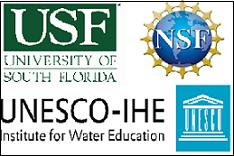By ALPS
One week after coming back from Delft and I barely believe I was there for 12 weeks. Before leaving to the Netherlands, I made a checklist of all the things I had pending before the trip. I think It'd be good to make a new list accounting for the most relevant things we achieved during this experience. Let's see how this goes:
1) Build a Gl-AnMBR and bring it to full operation (COMPLETE)
2) Get in touch with your most geeky side at the Delta works (COMPLETE... and AWESOME!!)
3) Assess how UNESCO-IHE educates hundreds of people from around the world to solve water related problems in their respective countries (COMPLETE)
4) Work with Dr. Piet Lens and Dr. Amit Kumar (COMPLETE and many THANKS)
5) Visit NORIT, TU-Delft, Saxion University, Wageningen University, TU-Delft and KWR (COMPLETE)
6) Get in touch with your most feminine side in Keukenhof (The Tulip's garden) (COMPLETE)
7) Fall from your bike at least twice (COMPLETE and COMPLETE)
8) Travel around EU during the available weekends (you need a whole year to do this)
9) Try Belgian waffles (COMPLETE)
10) Try Belgian chocolate (COMPLETE, COMPLETE, COMPLETE... AND COMPLETE)
11) Try Belgian beer (incomplete)
12) Try the typical delicacy "haring" fish (COMPLETE and not repeating this)
13) Try Dutch stroopwafles (COMPLETE)
14) Eat Ethiopian, Iranian, Italian, Belgian, French and Venezuelan delicious food (COOOOOMPLETE)
15) Gaining 8 lbs after items 9, 10, 12, 13 and 14 (COMPLETE)
16) Meet amazing people without whom this experience hadn't been the same (COMPLETE)
I can't thank enough USF, NSF, UNESCO-IHE and specially Dr. Daniel Yeh for this incredible opportunity. The IRES program offers to students the possibility to expand their horizons in terms of research and life experience. Living in another country with a complete different culture, language and set of mind improves your aptitudes as a tolerant human. As a water engineer, you are able to realize that water quality and availability in the developed and developing world require prompt and effectiveness solutions. Idealization of those solution puts us apart from the the real objective of making them as sustainable as possible.
Sunday, August 8, 2010
Subscribe to:
Posts (Atom)
